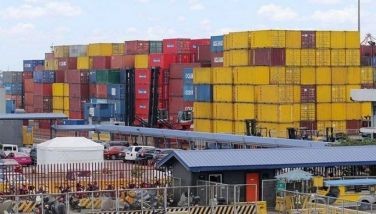Remittances of Pinoys in US capital declining
WASHINGTON – Filipinos living in the Washington DC metropolitan area are sending less remittances and balikbayan boxes to relatives back home because of the economic and financial crisis in the United States, a leading door-to-door cargo and money remittance company serving the Philippines said.
Carmen de Jesus, chief financial officer of Forex, noted a two-percent drop in remittances and a three-percent decline in balikbayan boxes sent over the past few months.
Because of this, De Jesus said the company is expected post its slowest growth rate on record this year.
“Some of our customers have complained about money being tight or losing their jobs,” she said, adding, “I don’t see the US economy getting better anytime soon.”
De Jesus described the drop in value of the US dollar and the tightening credit situation in the US as a “double whammy.”
Despite a drop in remittances, she said, business for Forex was still relatively good. “We’re still growing, its just that we’re not growing as fast as in previous years though this is to be expected because we are now a mature company.”
Forex claims it delivers more than 500,000 balikbayan boxes a year and remits a substantial portion of the earnings of overseas Filipino workers (OFWs).
According to the last official figures issued by the Philippine Embassy in Washington, remittances by Filipinos and Filipino Americans in the US in 2005 reached about $5.5 billion out of a worldwide total of some $9.5 billion.
Of some eight to nine million Filipinos overseas, about 30 percent are in the US.
De Jesus said while the Philippines has suffered a slight drop in remittances other countries have fared worst.
“From what I hear in the industry, remittances to Mexico have gone down by a significant margin, I think as much as 20 percent due to what is happening in America,” she said.
The Washington Post said the rate of remittances to Latin America has declined and this would potentially exacerbate poverty in many countries, including Brazil, Mexico, El Salvador and Guatemala.
It said the Inter-American Development Bank projected that Latin American migrants will send home about $67.5 billion in 2008, a slight increase of about 1.5 percent compared with the $66.5 billion sent home last year.
‘Recession-proof’
But while acknowledging that Filipinos in the US would be affected by the ongoing financial crisis there, the National Economic and Development Authority (NEDA) does not see it having any substantial impact on the growth of remittances this year and the next.
In a briefing held by the President’s economic managers at Malacañang yesterday, Socioeconomic Planning Secretary Ralph Recto noted that the economic slowdown in the US would affect to some degree OFW remittances from the country, but not as heavily as some would think.
Budget Secretary Rolando Andaya Jr. noted that the jobs of most Filipinos in the US are “recession-proof” in that these are in sectors not affected by the movements in the economy.
Recto explained that a significant number of Filipinos in the US are employed as doctors, teachers and nurses. He said not much are working in the financial sector where all the turmoil is being experienced.
The US is just one of the countries where a substantial amount of remittances originate.
Recto noted that outside of the US, specifically in the Middle East where hundreds of thousands of Filipinos are employed, the economy is booming and this means more remittances to the Philippines.
“So we still expect positive OFW remittances for this year. We only expected a 10-percent (growth rate) but it has been roughly at 18 percent and so there’s no reason why we should expect OFW remittances to go down next year as well,” Recto said.
“It may not have the same 18-percent growth as this year, but still a substantial increase, substantial remittances are still expected next year,” he added.
The Bangko Sentral ng Pilipinas (BSP) expects OFW remittances to hit a record $15.9 billion at the end of the year, which has not been amended in spite of the ongoing global financial crisis.
This has been supported by figures recorded by the BSP in the first seven months of the year at $9.6 billion, or an increase of 18.2 percent over the same period last year.
For 2009, the BSP expects remittances to continue its upward trend and post a yearend total of $18.3 billion.
OFW remittances have historically pulled up the Philippine economy, regardless of what was going on within and outside the country.
President Arroyo has repeatedly acknowledged the contribution of the OFWs to the country, not only in terms of providing dollar inflows for the economy but also in building up the reputation of the Philippines as a dominant source of quality labor in all fields. – With Marvin Sy
- Latest
- Trending

























